Contents
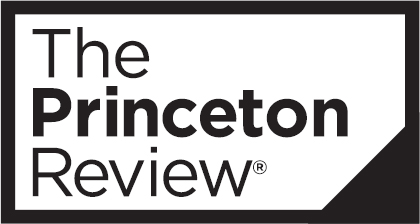
Editorial
Rob Franek, Editor-in-Chief
Casey Cornelius, VP Content Development
Mary Beth Garrick, Director of Production
Selena Coppock, Managing Editor
Meave Shelton, Senior Editor
Colleen Day, Editor
Sarah Litt, Editor
Aaron Riccio, Editor
Orion McBean, Associate Editor
Penguin Random House Publishing Team
Tom Russell, VP, Publisher
Alison Stoltzfus, Publishing Director
Jake Eldred, Associate Managing Editor
Ellen Reed, Production Manager
Suzanne Lee, Designer
The Princeton Review
555 W. 18th Street
New York, NY 10011
E-mail:
Copyright 2017 by TPR Education IP Holdings, LLC. All rights reserved.
Published in the United States by Penguin Random House LLC, New York, and in Canada by Random House of Canada, a division of Penguin Random House Ltd., Toronto.
Terms of Service: The Princeton Review Online Companion Tools (Student Tools) for retail books are available for only the two most recent editions of that book. Student Tools may be activated only twice per eligible book purchased for two consecutive 12-month periods, for a total of 24 months of access. Activation of Student Tools more than twice per book is in direct violation of these Terms of Service and may result in discontinuation of access to Student Tools Services.
ISBN9780451487865
Ebook ISBN9781524710330
GRE is a registered trademark of Educational Testing Service, which is not affiliated with The Princeton Review.
The Princeton Review is not affiliated with Princeton University.
Editor: Meave Shelton
Production Editors: Liz Rutzel, Kathy G. Carter, and Sara Kuperstein
Production Artist: Deborah A. Silvestrini
Cover art by Tetra Images / Alamy Stock Photo
Cover design by Suzanne Lee
v4.1
a
Acknowledgments
The Princeton Review would like to thank Doug French, author of the first edition, Kyle Fox and Kevin Kelly for their contributions to this edition, and John Fulmer, National Content Director for Graduate Programs, for his careful oversight.
Special thanks to Adam Robinson, who conceived of and perfected the Joe Bloggs approach to standardized tests, and many of the other successful techniques used by The Princeton Review.
Contents
Register Your Book Online!
Go to PrincetonReview.com/cracking
Youll see a welcome page where you can register your book using the following ISBN: 9781524710330
After placing this free order, youll either be asked to log in or to answer a few simple questions in order to set up a new Princeton Review account.
Finally, click on the Student Tools tab located at the top of the screen. It may take an hour or two for your registration to go through, but after that, youre good to go.
If you have noticed potential content errors, please e-mail with the full title of the book, its ISBN number (located above), and the page number of the error.
Experiencing technical issues? Please e-mail with the following information:
your full name
e-mail address used to register the book
full book title and ISBN
your computer OS (Mac or PC) and Internet browser (Firefox, Safari, Chrome, etc.)
description of technical issue
Once youve registered, you can
Download printable study plans for the content in this book, as well as a handy glossary of math terms
Read important advice about the GRE and graduate school
Access crucial information about the graduate school application process, including a timeline and checklist
Check to see if there have been any corrections or updates to this edition
Look For These Icons Throughout The Book
 Online Articles
Online Articles
 Proven Techniques
Proven Techniques
 Applied Strategies
Applied Strategies
 More Great Books
More Great Books
Chapter 1
Introduction
ADVICE FOR THE FAINT OF HEART
Welcome to The Princeton Reviews MathWorkout for the GRE, the one-stop shop for all of the mathematical knowledge and practice youll need to effectively tackle the Math section of the GRE.
Youve bought this book, which means you may be one of many grad school candidates who are approaching the math, or quantitative, portion of the GRE with a little bit of trepidation. This might be for any of several reasons, including the following:
You come in contact with the word variable only when its used to describe the weather.
Your first thought about Pythagoras is that he might have been a character in The Lord of the Rings.
You regard standard deviation as more of a psychological problem than a mathematical one.
If any of the above pertain to you, youre definitely not alone.
But dont worry, thats what this book is all about. Its two main objectives are (1) to give you an overview of all of the math concepts you could see on the GRE, and (2) to give you simple strategies for handling even the most complex math you could encounter on test day.
WHAT KIND OF MATH DOES THE GRE ROUTINELY TEST?
The good news is that the GREs Math sections dont test anything that you learned after your sophomore year of high school, so the concepts arent extremely advanced.
The bad news is that the GREs Math sections dont test anything that you learned after your sophomore year of high school, so it may have been a long time since you studied them.
Thats largely why this book was written: to help you build up an impressive canon of math knowledge that will help you score your best on the quantitative portion.
The GRE supposedly was written so that graduate schools might get a better sense of an applicants ability to work in a postgraduate settinga goal that is lofty and unrealistic at best. The test doesnt even measure how intelligent you are; if you take a test-prep course and your score improves, does that mean youre any smarter? Nope. Yet you can improve your score just by learning about what to expect on the GRE.
All the GRE really tests is how well you take the GRE.
Succeeding on the quantitative portion of the GREor any standardized math test, for that matteris as much about relearning math concepts as it is about modifying the way you think. There are several very important skills to cultivate when youre preparing to take the GRE, and each of them is attainable with the right guidance, a strong work ethic, and a healthy dose of optimism.




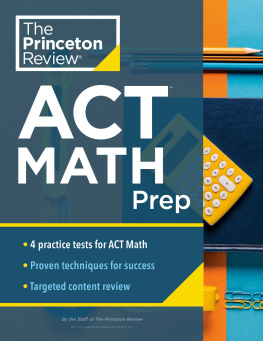
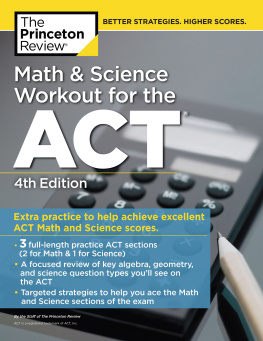
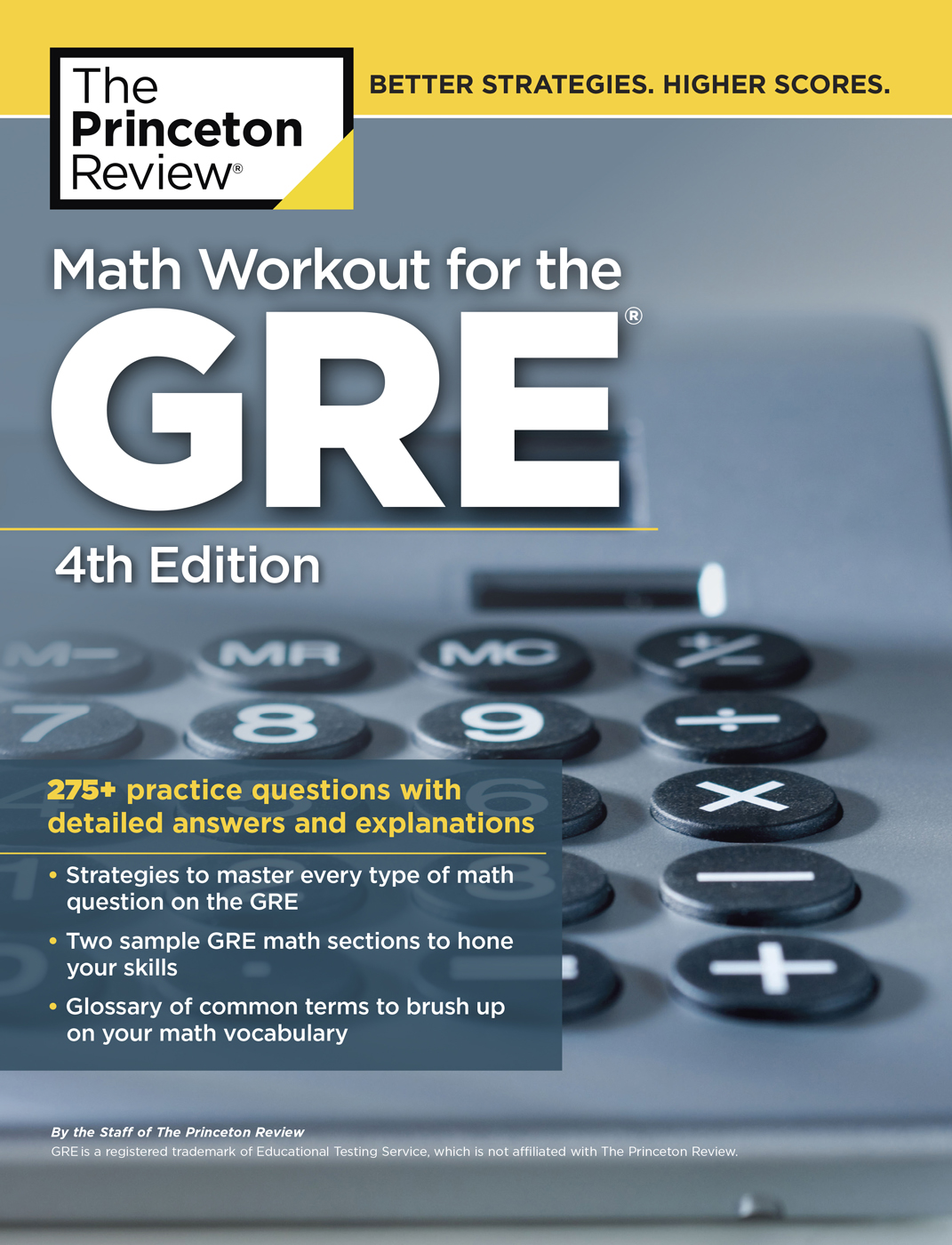
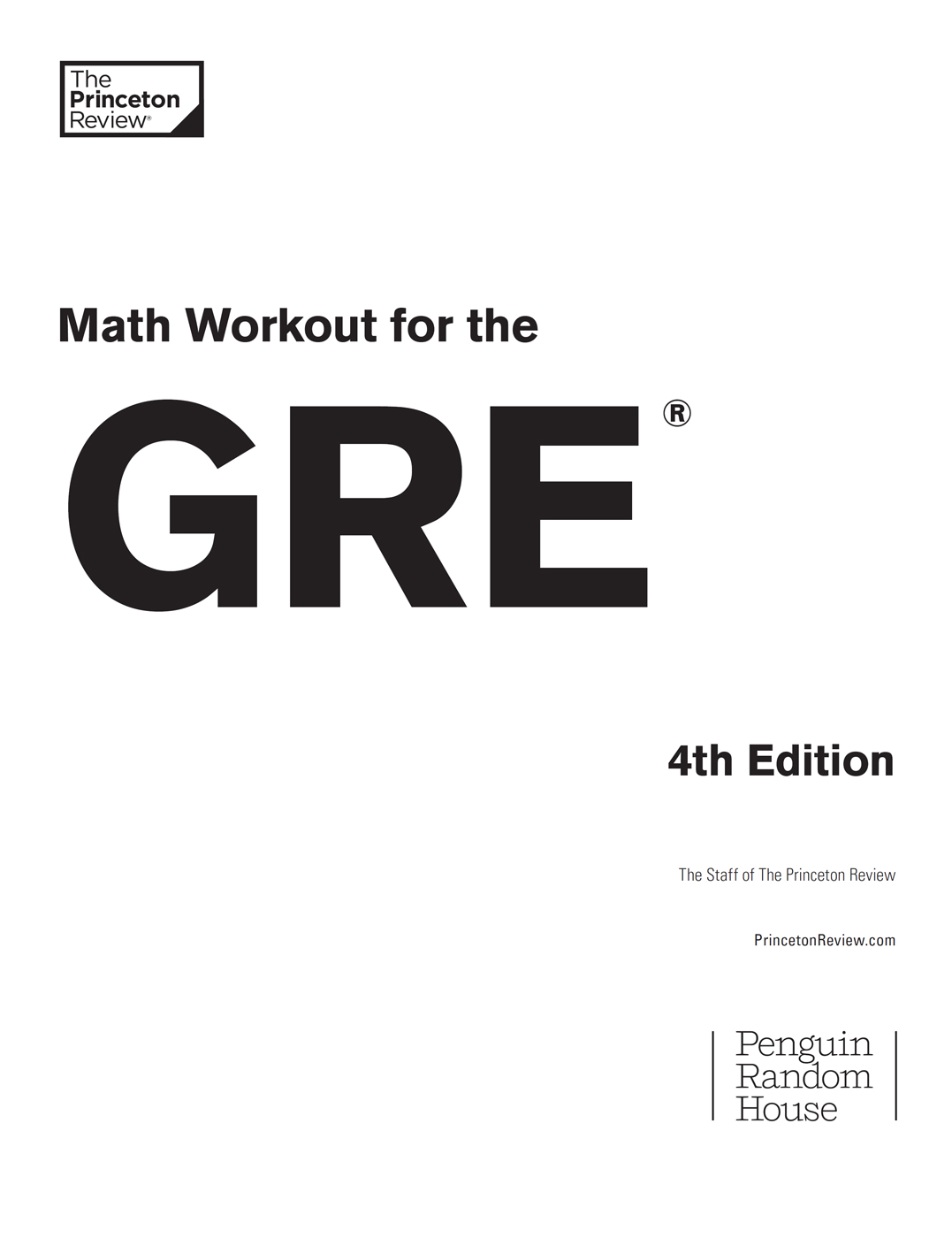

 Online Articles
Online Articles Proven Techniques
Proven Techniques Applied Strategies
Applied Strategies More Great Books
More Great Books